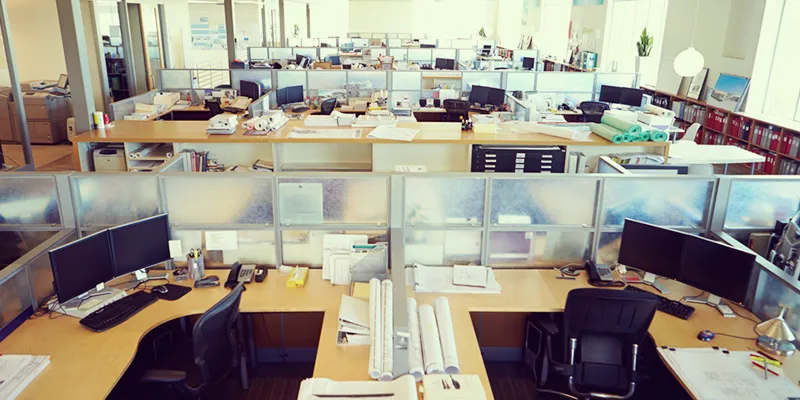Why an open office is a curse rather than a blessing
Nearly 70 percent of offices today have an open plan, and it is a hot favourite with startups all across the world. This is because today’s entrepreneurs believe that having an open office layout promotes collaboration and they literally break down walls between employees. Another reason for new businesses to lean towards open office plans is that it maximises the use of space while keeping costs to a minimum.

Image : shutterstock
The brainchild of a group of Germans designers who sought to promote better communication and the flow of ideas, the open office is now more a bane than a boon as many are finding out the hard way. A study by psychologist Matthew Davis revealed that this decision was proving counter-productive, and the more senior the employee, the higher the damage. Employees who were part of a laid-back innovative enterprise were found to have less concentration, low motivation, greater stress, and were prone to uncontrolled interactions. Around 38,000 employees were surveyed, and the open office system was found to have an adverse impact on attention spans and creative thinking.
Here are a few reasons why you might want to rethink the open office scenario at your workplace.
Lack of privacy
The absence of doors or walls means everyone can see and hear what you are saying and doing. This can prove an impediment when there is a need to be honest and forthright about certain matters. Nothing will remain private and confidential, which can make everyone – from the senior executive to the new fresher – uncomfortable. The end result would be frustration, as venting in private with a colleague will also no longer be an option.
Decreasing work rate
With an open office, it is easy to be distracted by what is happening around you. It plays spoilsport on everyone’s concentration. Also, interruptions by colleagues are likely to increase and can slow down work significantly.
Loudness
When three can be a crowd, how can 15-20 people, at a minimum, working in one space not be a noisy crowd! The ringing of phones, conversations, keyboard noises, drawers opened and shut and chairs being pulled out are just some of the noises that you can expect to hear.
Far from perfect environmental conditions
An open floor plan indicates that not all employees will get a seat that gets sufficient natural (or artificial) light. Similarly, the air conditioning will be set at a particular temperature and cannot be changed to suit individual requirements. When people are uncomfortable, working efficiently can be difficult.
Lack of personal space
Small or big, a space to call your own is essential to quietly sit down and gather your thoughts. When employees can personalise their space to suit their working style, it definitely boosts efficiency and productivity.
These are some points to keep in mind when designing your office space. The kind of office plan you choose will depend largely on your area of work and way of functioning. So it is important to come up with something that works for your business and your employees rather than keeping up with the current trend.
https://www.salesforce.com/blog/2015/04/the-5-biggest-drawbacks-open-office-plans-gp.html
http://www.newyorker.com/business/currency/the-open-office-trap







